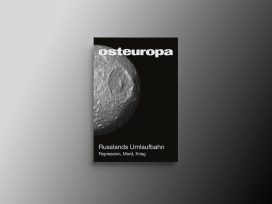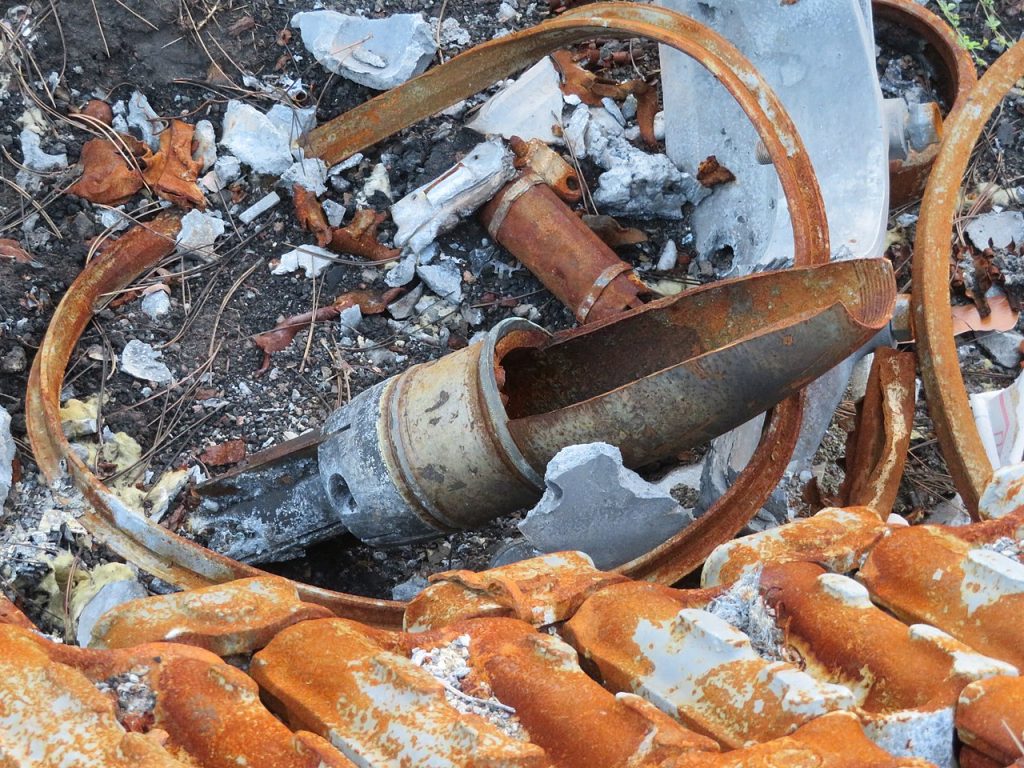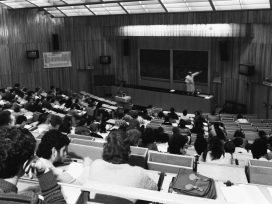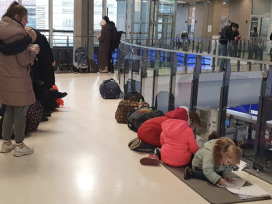Any aftermath needs to be thought about beforehand. Questions need to be asked now about what we want after Russian and Ukrainian weapons have stopped firing, which sooner or later they will. Every conflict comes to an end, if only through the exhaustion of the belligerents’ energies. However, a ceasefire does not necessarily amount to peace, and we should bear in mind that there are kinds of peace worse than war itself.
The end of peace means that we need to critically reflect on what we’re prepared to accept as ‘peace restored’, above and beyond the suspension of the war, and on the steps that would take us from here to there.
The best minds are not always of a mind. Jürgen Habermas, a co-signatory with Jacques Derrida of a manifesto against the 2003 invasion of Iraq, could certainly not be accused of being a warmonger. In April 2022 he argued that an aspiration for peace was not ‘equivalent to the demand to sacrifice a politically free existence on the altar of mere survival’. A stable peace, he went on, required justice, without which all ceasefires remain precarious. In February 2023, after the first year of the Ukraine war, Habermas attenuated the tone of that statement and argued for negotiations of a vaguely specified preventive quality, before we reach a dramatic crossroads: namely, the choice ‘either to intervene actively in the war or, in order not to trigger the first world war among nuclear-armed powers, to leave Ukraine to its fate’.
In Habermas’s defence, he was addressing the immediate question of how to handle Ukraine’s ever-increasing requests for sophisticated weaponry. But with all due respect, this way of framing the issue runs the risk of indicating to the aggressors that their best interest is to drive us precisely to that intolerable crossroads, at which they have a reasonable hope that Ukraine will be abandoned.
I’m interested, however, in addressing the broader question of the goals that ‘we’ – not just the EU, not just the EU and the US, not just the NATO member states, but all those who care for democracy (East and West, North and South) – should want to pursue for the world after a ceasefire. There has been plenty of discussion of whether Ukraine will regain its pre-2022 or even pre-2014 territorial integrity, or whether there will be a Korea-like partition of the country, with or without a buffer zone. But the question about the state of the world after the war is broader. Assuming that a dignified, worthwhile armistice can be reached (and not a peace treaty that sanctions the defeat of one belligerent), we need to ask what the world will look like in the aftermath – or rather, how we, critical theorists and committed democrats, should wish it to look.
Before addressing that question, we might pause to reflect on three ways in which Russia’s invasion of Ukraine has changed the world.
First, the prospect for institutions of global governance has been deeply affected. Writing at the beginning of the twenty-first century, Michael Walzer contrasted several possible forms of global governance and global institutions. The status quo at the time, centred on the Kofi Annan-led UN (which was about to outline the ‘Responsibility to Protect’ doctrine, later adopted by Ban-Ki-Moon), then looked like a moderately conservative order. It now seems utopian. In the presence of an aggressive, expansionist state with nuclear weapons, even John Rawls’s ‘realistic utopia’, sometimes criticised for its commitment to enforcing only an abridged list of human rights and to containing ‘outlaw’ states, is no longer ‘realistic’.
Second, the belief that global trade and commerce rein in the aggressive posturing of authoritarian states has been shaken. This has been a leitmotif since Montesquieu’s claim, in The Spirit of Laws, that ‘the natural effect of commerce is to lead to peace’. This was then amplified by Thomas Paine’s optimistic view, in The Rights of Man, that ‘if commerce were permitted to act to the universal extent it is capable, it would extirpate the system of war’. Kant’s famously intimated that republics don’t wage wars against each other, while Mead thought that ‘the economic process goes right on tending to bring people closer together’. The credo inspired German Ostpolitik from Brandt to Merkel, summed up in the slogan Wandel durch Handel (‘change through trade’). But now trade has proven to be weaponisable. Dependency on energy sources, fuels, minerals and high-tech has turned commerce into an instrument of political pressure and aggression.
From a being a factor of stability, economic interdependency has thus become a factor of instability. This has put a premium on national or at best regional self-sufficiency and independence from global flows of exchange. Neither globalisation, as idealised in the past, nor ‘de-globalisation’ seem likely outcomes. Instead, we might be heading towards differentiated globalisation: a mix of globalised trade for strategically inert goods and services, regional or imperial self-sufficiency for strategically crucial resources.
Third, the world as an international community of 195 states once again appears polarised. The democratic states grouped in NATO, together with Australia and Eastern Asia, make up one camp. Opposing them is a much less integrated camp, drawn from every continent, containing states which either support, do not openly condemn, or are simply indifferent to Russia’s invasion of Ukraine. Unlike during the Cold War, these camps coalesce around not two, but three superpowers. This suggests long term instability. Moreover, the first camp accounts for over 50% of the world’s GNP but only 12% of the global population. This makes it vulnerable to the accusation of being an exclusive club for the world’s wealthiest countries.
Given that none of these three factors is likely to change significantly over the next two or three decades, what kind of world should a critically minded person, or democratic constituencies, aspire to?
A critical commitment to justice must seek to reduce the tension between two goals: of global security for all democratic states – requiring tighter coordination between them, both military and commercial (including energy needs) – and of preventing the further spread of the image of the richest 12% building a global citadel for the defence of privilege. If we include their closest supporters, the other two superpowers – Russia and China – amount to a population of about 17% of the world’s population. That means the remaining two-thirds are watching the drama unfolding from a position of general sympathy for one side or the other. The state of the world in 2050 will largely depend on the consensus that emerges between these two-thirds of the world’s population and their elites.
But a consensus on what? It is unlikely to materialise around the superiority of liberal democracy. Today, elections are nothing more than a façade. When only three countries in the world don’t hold regular elections, they have lost their former meaning as trademark of democracy. Full, vigorous democracy requires party pluralism, freedom of speech, of the press, of religion, of movement and of association. A global endorsement of all these ingredients looks unlikely.
The consensus that critical democrats should seek among these two-thirds of living human beings must therefore be broader. It must be a consensus on the necessity of enforcing the principles laid out in the Charter of the United Nations: the outlawing of wars of aggression against another recognised state, no matter the nature of a dispute. That is the baseline of a truly post-Westphalian world order, whether it involves regulating a couple of hundred nominally sovereign states, or three empires and their clients. Wasn’t this solemnly carved in the marble of the UN Charter? Apparently only formally, as the war in Ukraine shows.
This, then, is the primary proposition that the coalition of existing democracies must uphold and for which they should seek to win global consensus. No one is safe in a world in which eleven states possess nuclear weapons and the principle of territorial integrity can be ignored when convenient. This is a message that can appeal to every constituency in the world, regardless of its democratic status. In short, a plea for a global rule of law may find a sympathetic ear among those less receptive to pleas for democracy.
And then the doubts of others must be addressed, specifically those who remain on the side-lines because of what they see as the partisanship of the democratic coalition. Ukraine’s supporters, they point out, are prepared to go almost to the point of direct involvement in the war, but ignore analogous situations elsewhere in the world. Criticism of that true, undeniable facet of the current predicament should not, however, equal an indictment of those who support victims of aggression as such – even if other victims are ignored. Rather, the criticism should be directed at the absence of a global rule of law with institutions capable of preventing all violations of territorial integrity everywhere, and not just those violations deemed of strategic significance by some.
Without those institutions, or in the face of their inefficacy, the only choice for small states is to acquire strategic significance for one of the superpowers, an arrangement akin to a medieval pact of obedience or protection. No one more than ‘small states’ should prefer the strict enforcement of the UN Charter over the current loose application, vitiated by veto, which leaves them reliant on the arbitrary intersections of the political interests of the powerful.
Above and beyond the unspeakable suffering of the Ukrainian people, the long-term cost imposed on the world by the Russian invasion is the damage done to institutions of global governance. The goals of organisations whose aim is to champion peace and prosperity have essentially shrivelled to survival and basic security. The UN, paralysed by the veto wielded by members of the Security Council, now rivals the ill-fated League of Nations in its level of inefficacy. Will the General Assembly ever manage to put enough pressure on Russia to accept an amendment of the veto power?







